- Home
- Jeff Mariotte
Sanctuary Page 2
Sanctuary Read online
Page 2
“Yeah, okay. I’ll try to find out if any of them saw anything. If Fred was snatched, someone would have noticed, right? Nobody gets out until I find out everything they saw.”
Angel nodded, distracted, and Lorne disappeared down the stairs. Gunn, Cordy, and Wes looked stricken. “We’ve gotta find her, man,” Gunn said, his voice tight with rage.
“We will, Gunn,” Wesley assured him. “She can’t have gone far. Remember, this is what we do.”
“And we’re good at it,” Cordelia added. “We almost always find who we’re looking for. I meant to say always. Always always, twice for emphasis. Look at Angel, he’s already got an idea.”
It shows on my face? Angel wondered. Whatever, she’s right. “It’s just a hunch, but what if this is all part of a larger plot?” he suggested. “Either all of these events happened at once by pure coincidence—which is hard to believe. Or else the bomb was meant to draw us outside. The drive-by—look, if they really wanted to hit some of us, they could have, we were all just standing there in a big clump. That was meant to distract us while somebody grabbed Fred.”
“You could be right,” Gunn said. “Pretty elaborate, though. Who? And why? What do they want with her?”
“If we knew the answer to that, we’d know where to find her,” Wesley offered.
“Then we’ll find out,” Angel declared. “And we don’t let up until we have her back.”
Chapter Two
“Slight change of plans for the evening, folks,” Lorne announced from the stage, speaking with uncharacteristic gravity. “A friend of mine is missing, and it’s just possible that one of you saw something that will help us find her—even if it’s not something you think is significant or important. So we’re all going to stay put in here while I talk to each of you, one on one, okay? Don’t think of it as a hardship, think of it as sparkling conversation with your charming and talented Host.”
There were some groans from the audience, and Lorne could see at a glance that this wasn’t going to be particularly popular.
“You can’t go out the front door, anyway,” he reminded them. “Not with all those firefighters and cops out there. So stay put, enjoy the music, and”—he hated to take it this far, but it was what airlines did when planes were stuck on the tarmac for too long, and maybe it would loosen some tongues—“and the free drinks!”
At this announcement, cheers outnumbered the groans. That’s more like it, Lorne thought. No difference between demons and humans in that respect. If it’s free, they’re in favor of it. “So who’s up first?” he asked, filling his voice with enthusiasm. “Who’s got a song they’re dying to sing? Who wants to excite our ears with their dulcet tones?”
A Brachen demon Lorne vaguely knew pushed his chair back from his table and rose. “I’ll go,” he offered with a wan half-smile. His name was Stark, Lorne remembered, and like all Brachens he had soft blue spikes jutting out from his flesh, pincushion-style. He was a mild sort, and seemed a bit hesitant to approach the stage.
“Excellent, Mr. Stark,” Lorne said effusively. “Mr. Stark here has a terrific voice, gang—think Robert Goulet, only with even more personality. What are you going to sing for us tonight, Mr. Stark?”
“I thought I’d go for ‘I Write the Songs,’” Stark replied.
Lorne clapped his hands together once. “Perfect,” he said. “Look out, Barry Manilow. Who in fact didn’t write that one, of course—Barry’s megahit was penned by none other than L.A.’s own Beach Boy Bruce Johnston. So who said irony is dead? Cue it up, maestro!”
He surrendered the stage to Stark, who swayed uncertainly at the microphone as the first notes of the song began to play. Lorne didn’t have any particular plan in mind beyond, as he’d said, talking to every single demon in the club tonight to see if they knew anything or had seen anything that could help locate Fred. He knew that, in human society, police detectives would have done the same thing. But human cops weren’t likely to be called in on this case, and even if they were they’d get no cooperation from the clientele of Caritas. The peaceful coexistence of demons and humans was tenuous at best, no doubt aided by the fact that most humans didn’t know that demons existed. If they did, the story would certainly be different. As it was, demons made most of the necessary concessions to live in a human-dominated world. If the humans knew what they shared the planet with, though, they’d likely spare no expense or effort to wipe out the demon population.
With no more developed plan than he had, Lorne decided to just start at the nearest table to the stage and work his way around the club table by table. As Stark began belting out the first chorus—he really is good, the Host thought, once he gets past his initial intestinal butterflies—Lorne pulled out a chair and sat down across the small table from a Skander demon. Before he spoke he watched Stark for a moment, getting a sense of the Brachen’s path. He reasoned that if anyone remaining in the club had been involved with Fred’s disappearance, that might show up in a reading. But from Stark all he got was a sense of deep sadness relating to a romantic complication. If Stark had asked him for a reading he’d have to tell the demon that he should give up on the human woman he’d been courting, since it was clear that the relationship would only end in heartbreak for him if he pursued it.
Which didn’t rule him out in any way—the trouble with Lorne’s empathic power was that it couldn’t predict with certain accuracy and it couldn’t focus only on certain topics. He saw what he saw, but usually that was only a glimpse, the merest fraction, of someone’s possible future. Never the whole picture.
Lorne turned away from the stage and faced the Skander demon. “Enjoying the show?” he asked by way of an opening.
The Skander barely glanced at him and grunted something that may have been an affirmative. Skanders weren’t known as excessively skilled in the social graces—kind of like Angel in that regard, Lorne thought offhandedly.
“You heard about what happened?” Lorne prodded. “The girl disappearing? Angel’s associate, Winifred?”
“Heard about it,” the Skander answered plainly. “Everybody heard about it. Don’t know anything, though.”
Lorne looked at the Skander carefully, as if he could read the demon’s aura even without the singing. The Skander’s skin was a flat gray, like freshly poured cement, roadmapped with blue and purple veins. His face was broad and flat, with two glowing orange eyes set far apart under a heavy ridge of brow and a thick-lipped mouth filled with what seemed like hundreds of small, needle-pointed teeth. He had gone heavy on the cologne, which seemed odd considering the unpleasant physical form he took. Skanders could cast glamours, Lorne knew, changing how anyone perceived them, and he wondered why they would choose to walk around in what he believed to be their natural, but horrendously ugly, form. Why not pick a more pleasing shape, he thought, like mine?
Perhaps more significantly, Skanders were dimensional travelers, capable of opening—even creating, according to some scholars—hidden dimensional portals wherever they went. And it made sense that since Fred had been spirited away virtually behind everybody’s backs, a dimensional portal would have been one way to do it. Lorne was determined to keep his suspicions to himself, though, and to try to approach each interview with an open mind. “You went outside, though,” he said, “when the first big bang went off, right? Tell me what you saw with your own baby blues. Or oranges, as the case may be.”
The Skander’s voice sounded like rocks being run through a food processor. “I saw a building on fire. Then I came back in.”
“Look, handsome,” Lorne urged him. “We’re all kind of in this together, you know. So you might as well be cooperative, because we’re going to be here a long time if you hold back on me. What’s your name, friend? You know mine.”
“Quortloothtonsiv,” the Skander told him, his voice expressionless. One of his meaty hands was wrapped around a martini glass, and he took a quick drink from it.
Lorne tossed him a smile. “Let’s just go with Quort, okay
? It’d take me all night just to learn that. So, backtracking, Quort. You went outside and there was a building on fire. What else?”
“Hurt my eyes.” Quort touched the gray skin beneath his right eye with one sausagelike finger. The eye had an internal glow, as if some of the fire was trapped inside it. “They’re sensitive to light.”
“I’m sorry to hear that, brother,” Lorne said with genuine sympathy. It happened to a lot of the demonic races—they spent most of their time in the dark, trying to remain unnoticed by the human world, until bright light became painful to see. “Go on.”
The Skander sighed, as if realizing that the Host wasn’t going to leave him in peace until he elaborated on his story. “I saw the fire and turned away,” he said. “I was blinking and my eyes were watering from the light. Then I heard the car coming, and looked up again. I still wasn’t seeing clearly, because of the fire, but I thought maybe they were Roshons, in the car.”
“Roshons?” Lorne echoed. “Really?”
“Like I said, my vision was pretty blurry. But maybe.”
Roshons were vicious, predatory flesh eaters, Lorne knew. They had no love at all for humans, except maybe as between-meal snacks. They even tended to keep away from places like Caritas, where demons who could get along with humankind were tolerated. Roshons preferred the company of their own kind, but Lorne had never heard of them attacking a mixed group of demons before. It would have been more like them, he thought, to go out and stalk a single human, or even a small group of them, for the sport of it. If they did pull off something like the night’s drive-by shooting, there would have to be a profit element to it, as Roshons were basically gangsters of the demonic world.
“Why do you think that?”
“The shapes of their heads, mainly,” Quort answered. “I mean, it could have been a bunch of baldheaded humans with strange growths on their heads and blue skin, but how likely is that?”
“Not very,” Lorne agreed. “You’re pretty sure about the blue skin? Because I was thinking green.” He held out one of his hands and looked at it thoughtfully. “Although not as rich and pleasant a shade as my own, of course.”
“I told you, I can’t be sure of anything.” There was an undercurrent of anger in the Skander’s voice, probably in reaction to Lorne’s insistent questioning. “You asked what I think I saw, so I’m telling you. You don’t want to hear it, move on and bug somebody else.”
“I’m not finished bugging you,” Lorne said quickly, with a smile he hoped was ingratiating enough to calm the big guy down. “I just want to hear your story as well as you can tell it.”
Quort nodded once, curtly, and toyed with his glass. Lorne noticed that he’d emptied it and snapped his fingers, pointing at the glass, for Luis the bartender to refill. “Okay, then. I thought maybe they were Roshons, but I wasn’t sure. I saw the guns and I ducked.”
“Can’t blame you for that.”
“Right. They opened fire—although if they’d really wanted to do some damage, doesn’t it seem like there’d be dead demons all over the sidewalk? Big group like that, all standing close together, makes a pretty easy target, doesn’t it?”
“Good point,” Lorne said, surprised. Angel had thought of that, but he was an experienced detective.
“Doesn’t take much thinking to figure it out,” Quort followed up. “They wanted to make some noise, scare some of us. They weren’t really looking to kill.”
“But why?” Lorne wondered. “Unless they’re trying to tell me something about my business insurance….”
“Create a distraction, is my guess. That’s when the human disappeared, right?”
“Fred. Her name’s Fred. Winifred Burkle, really,” Lorne insisted. He didn’t want anyone to lose sight of what was really at stake—Fred’s safety, maybe her life. “She’s a perfectly lovely young lady.”
“She’s a human. Far as I’m concerned, the fewer the better. And she’s a friend of Angel’s, right?”
“Well, yes,” Lorne replied, feeling defensive now. “Of Angel’s and of mine, now that you mention it. What about it?”
“Angel hates our kind. He’s a demon-killing machine. I’ve heard he’ll kill demons whenever he can, he doesn’t care who or why or what they’ve done. I’m surprised you even let him in here, with all the blood on his hands.”
“You were sitting in here with him earlier. Did he kill anyone then?”
“This is a safe zone—even he respects Caritas. But if he caught any of us outside, you think he’d hesitate for a second?”
Lorne was astonished to see the conversation take this turn, though perhaps he shouldn’t have been. He’d never felt at any risk from Angel. He knew the vampire better than that. But the rest of the demonic community didn’t necessarily share his viewpoint or experience. “Of course Angel wouldn’t hurt anyone without a reason,” Lorne insisted. “He helps people—and sometimes demons—in trouble, but he doesn’t go out hunting for demons just because he can. He only does what he has to in order to help those who can’t fend for themselves.”
The Skander twirled his empty glass around on the tabletop and waited while Luis brought him a fresh drink. Then he took a sip of that one. When the bartender was gone, he finally spoke. “I had a friend who knew a Prio Motu,” he said. “This Prio was friends with a woman—helped her, protected her. Angel up and killed him for no reason at all.”
Lorne remembered the incident, though it had happened around the time he and Angel had first become acquainted. “I heard about that,” he said. “I also heard that Angel realized he’d made a mistake, felt just awful, and served as the human’s champion in the Prio’s place.”
Quort humphed. “Maybe. I don’t know about that. I just know that Angel’s got a rep for killing our kind at every opportunity. One of his human friends gets herself in trouble, it’s no skin off my nose.”
Lorne barked out a sharp laugh. “You don’t have a nose, Quort!”
The Skander just shrugged.
“So you don’t want to help because you think Angel’s a demon-killer?”
The words rushed out of Quort in an angry torrent: “I don’t want to help because I didn’t see anything helpful. I saw the car coming, but it was blurry. Then I was down on the ground like everybody else. When that was over, everybody was herding us back inside, and some humans were crying about somebody being missing. Well, big deal, you know? It’s not like there aren’t more than enough of them around already. What’s one more?”
The casual way he said it chilled Lorne to the bone. Quort didn’t care what happened to Fred, just because she was human and a friend of Angel’s. But certainly there were humans who felt the same way about demons—and if more humans knew they existed, Lorne knew, that attitude would be even more prevalent.
He was a peace-loving sort, and he wished everyone else could feel the same. Make love, not war, that was his philosophy. Life’s too short for blind hatred. Even for an immortal, like Angel.
“One more thing,” Lorne said, trying hard to keep a friendly tone in his voice. “Sing me a few bars.”
The Skander looked unhappy at the idea. “Of what?”
“Whatever strikes your fancy,” Lorne suggested. “It’s a karaoke bar—you must know a song or two.”
“I didn’t come in for a reading, I came in for some drinks,” Quort insisted.
“You got the drinks on the house,” Lorne riposted. “The trade-off is that you sing. Nobody has to hear you but me.”
Quort glanced left and right, as if checking to make sure he was unobserved. Then, softly, almost in a whisper, but with perfect pitch and surprising skill, he sang the first, ironically timeless lines of “As Time Goes By.” Then he stopped, clamping his mouth shut with a definitive clacking of teeth. He was done.
“That’s terrific,” Lorne told him, thinking, You must remember this. Even the skeeziest demons have a sense of romance. “There’s nothing like the classics.”
As with the Brachen onstage, though,
he didn’t get anything helpful from the Skander demon. He saw a confusing mixture of images when Quort sang, and sensations running from glee to terror to humiliation. Nothing seemed to pertain to Fred, though, and if he was to give the Skander a thorough reading he’d have to sit through a much longer song than that brief snippet.
But it was looking pretty apparent that old Quort wasn’t going to be much use in finding the poor girl. Lorne stood up and, without bothering to hide the sarcasm, said, “Thanks so much for all you’ve done. Enjoy the free drinks.”
As he walked away, he could hear the Skander humphing again.
Chapter Three
Cordelia turned in a slow circle, trying to take in all of Fred’s room at once. Her bed was neatly made, which was an improvement over the days when she had leaned her mattress against the wall and slept behind it. On top of a dresser were a hairbrush and a hand mirror and some cosmetics Cordy had given her but that she rarely used. She had thumbtacked a picture torn from a magazine to one wall: a bucolic Texas scene of bluebonnets in a meadow under a vast, cloudless sky. “Take a look at her room,” Angel had said. “See if you can spot anything that would make her a target.”
But Cordelia couldn’t, unless maybe some of the complex equations she had written on the walls in Magic Marker meant more to someone else than they did to her. Which is certainly possible, seeing as none of it means anything to me.
Fred hadn’t left the Hyperion Hotel much since they had brought her back to Earth, so she hadn’t had a chance to acquire many personal belongings, or make many enemies. She’d spent most of her time huddled in this room, working out math problems on the walls, and maybe mooning over Angel a bit. She was a strange young woman—brilliant, Cordelia knew, but her years in Pylea had left her more than a little offbeat. She came across as scattered, even nuts, at first glance. But Cordy knew that initial appearance disguised a steel-trap mind and an enormous heart.
Cordy herself had been considered scattered, in her high school days, for that matter—by people of a generous nature. Less kind people called her other names. It was true that school hadn’t been her highest priority. Popularity had been, with money and material things running a very close second, and then somehow she had gotten roped into the whole vampire-slaying gig with Buffy Summers, Willow Rosenberg, and Xander Harris, and little by little her priorities had shifted. She had grown a lot since then, she knew. She had become Angel’s best friend, she believed, and his most important associate in Angel Investigations, helping connect him to the human world and aiding him in his fight against evil. She had taken on the vision power that tied him to the Powers That Be—okay, unwillingly at first, she thought, but I really did have a chance to leave them behind, in Pylea, and I didn’t take it.

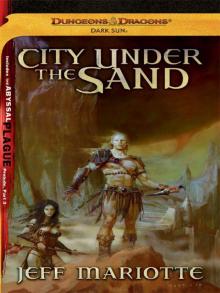 City Under the Sand
City Under the Sand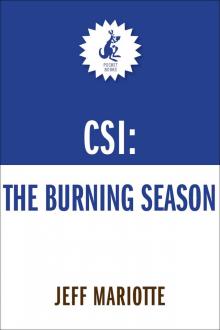 The Burning Season
The Burning Season Sanctuary
Sanctuary Winds of the Wild Sea
Winds of the Wild Sea Serpents in the Garden
Serpents in the Garden Close to the Ground
Close to the Ground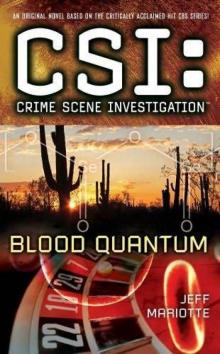 Blood Quantum
Blood Quantum Brass in Pocket
Brass in Pocket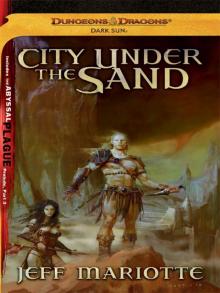 City Under the Sand: A Dark Sun Novel (Dungeons & Dragons: Dark Sun)
City Under the Sand: A Dark Sun Novel (Dungeons & Dragons: Dark Sun)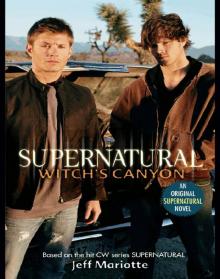 Witch's Canyon
Witch's Canyon STAR TREK: The Lost Era - 2355-2357 - Deny Thy Father
STAR TREK: The Lost Era - 2355-2357 - Deny Thy Father Dawn of the Ice Bear
Dawn of the Ice Bear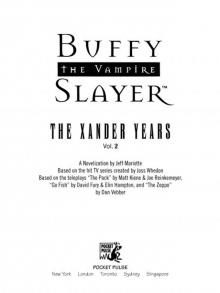 The Xander Years, Vol.2
The Xander Years, Vol.2 Ghost of the Wall
Ghost of the Wall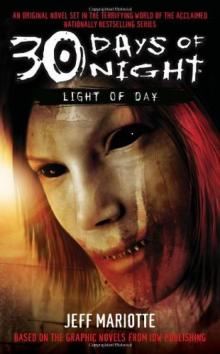 30 Days of Night: Light of Day
30 Days of Night: Light of Day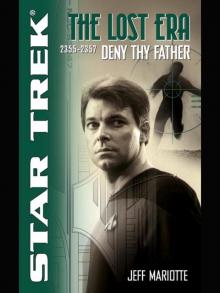 Deny Thy Father
Deny Thy Father Criminal Minds
Criminal Minds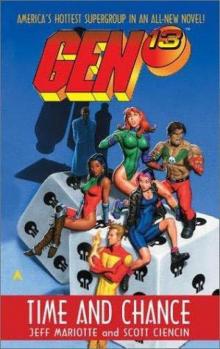 Time and Chance
Time and Chance The Folded World
The Folded World Bolthole
Bolthole Narcos
Narcos Right to Die
Right to Die